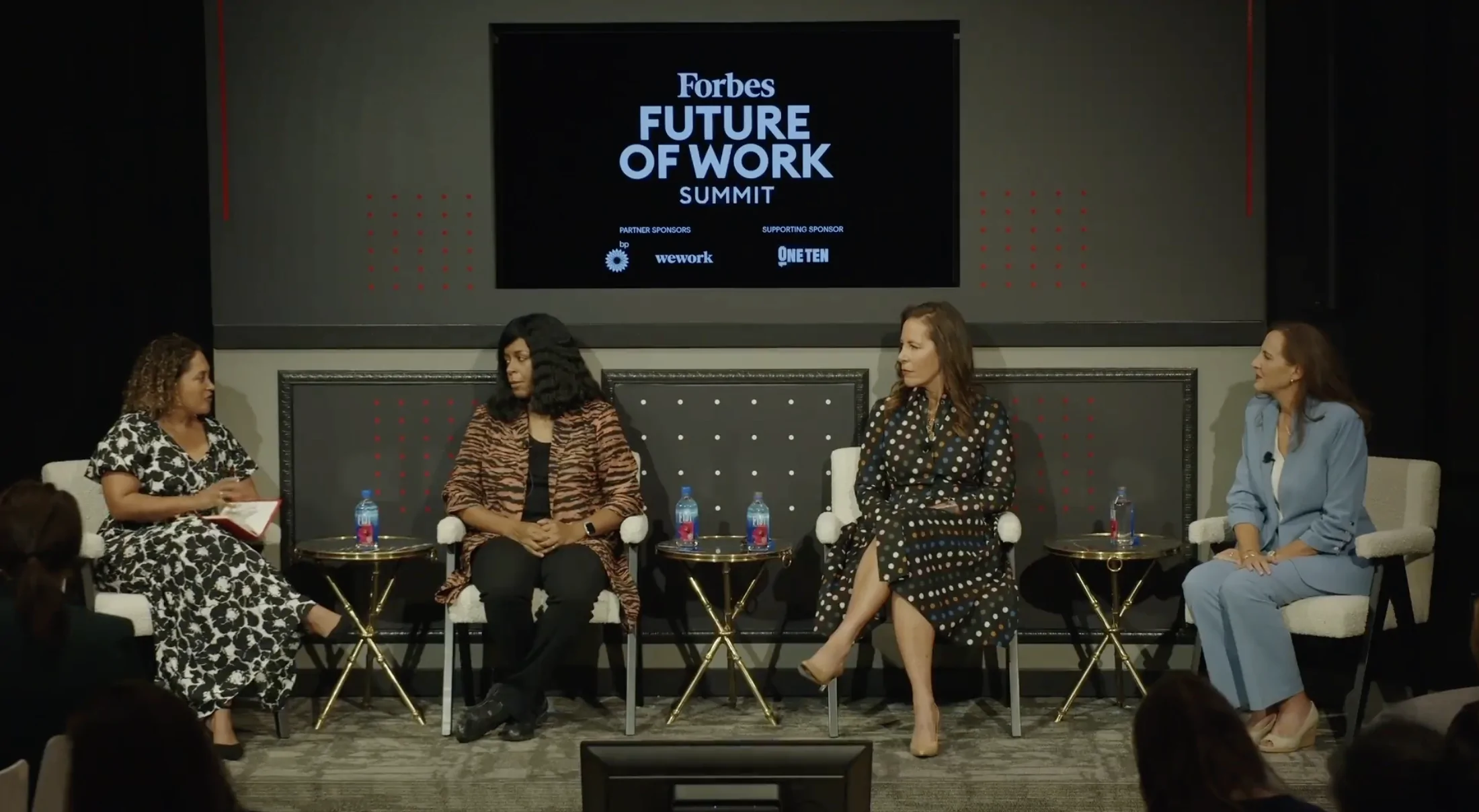Skills-First Hiring: Insights from OneTen CEO Debbie Dyson at the Forbes Future of Work Summit

10.29.2024
At the 2024 Forbes Future of Work Summit, OneTen CEO Debbie Dyson shared actionable insights on a panel titled ‘From Talk to Action: Making Skills-Based Hiring a Reality.’ She emphasized the need for companies to move beyond traditional hiring practices and embrace a skills-first approach—one that reflects the full potential of individuals, regardless of formal credentials. Watch the Panel Discussion.
Defining Skills-Based and Skills-First Hiring
Debbie Dyson began by clarifying the subtle distinction between skills-based and skills-first hiring—two terms often used interchangeably. She explained that OneTen sees skills-based hiring as a foundational framework that supports the implementation of skills-first practices. This framework includes addressing an organization’s human capital needs, identifying the skills required for roles, and guiding change management strategies.
Skills-first hiring, meanwhile, emphasizes prioritizing candidates' skills over traditional qualifications, such as four-year degrees, years of experience, or job titles. It encourages employers to focus on competencies and relevant experiences that align directly with job requirements, unlocking opportunities for a wider range of talent.
Breaking Barriers To Skills-First Hiring
Transitioning to a skills-based hiring model presents challenges, especially in overcoming biases that favor educational credentials. Many organizations overlook highly skilled candidates without formal degrees, despite their ability to excel. Debbie Dyson shared insights from OneTen’s recent Hiring Managers study, noting that although 91% of managers agreed on the benefits of skills-first hiring, only about 30% reported implementing it, revealing a gap between belief and action.
She explained that one of the reasons for this gap was the assumption by hiring managers that a four-year degree was associated with higher proficiencies in durable, or soft skills, such as critical thinking, problem-solving, and collaboration "There’s an assumption that a four-year degree guarantees these skills, but I don't know how we can validate that," she remarked. This underscores the need for hiring practices that fairly assess all candidates without creating new barriers.
Addressing Soft Skills in Skills-First Hiring
While employers are often comfortable evaluating technical skills, many find it challenging to assess soft skills. To address this challenge, OneTen conducts soft skills assessments to identify candidates' strengths, offering insights that go beyond traditional qualifications. These assessments aren’t designed to pass or fail but to showcase where candidates excel, helping employers better understand their potential. By presenting a well-rounded view of both technical skills and soft skills strengths, OneTen helps employers align talent with roles that fit their culture and business needs, reducing obstacles to adopting skills-first hiring practices.
Leadership and Change Management
Debbie highlighted that while top executives may champion skills-first initiatives, middle managers—who conduct interviews and make hiring decisions—play a crucial role in bringing these practices to life. For skills-based hiring to succeed, behavior changes are needed at every level of the organization. Dyson emphasized the importance of shifting focus in hiring decisions.
Traditionally, hiring managers have evaluated candidates based on where they went to school or their prior titles. A skills-first approach asks them to look beyond the resume and assess the full individual—their capabilities, experiences, and potential. Middle managers are key drivers in this shift, ensuring that new behaviors and practices are adopted in interviews and hiring processes. While leadership sets the vision, it’s the middle managers who enforce these changes and make skills-first hiring a reality.
Moving Past Labels to Action
When asked if skills-first hiring was just a “safer” way of saying DEI, Debbie responded with an emphatic “No”, clarifying that while DEI is important, skills-based hiring is about action, not just labeling initiatives under DEI. The real focus is on unlocking opportunities and delivering results, ensuring individuals are evaluated based on their skills rather than traditional credentials. Debbie Dyson emphasized that skills-first hiring is about creating equitable access to good jobs by broadening how talent is seen and valued.
Dyson explained that many talented individuals, despite years of experience, are often overlooked simply because they lack a four-year degree. “We’re saying, eliminate that barrier,” she stressed, noting that companies struggling with workforce shortages already have access to great talent—they just need to look beyond outdated criteria. This shift opens doors for the 60% of Americans without a four-year degree, who are otherwise excluded from many job opportunities.” The focus, she reiterated, should remain on action, enabling a win-win for companies and workers alike.
The Future of Work with Skills-Based Hiring
Debbie Dyson emphasized that there has never been a better time to embrace skills-first hiring. As organizations gain clarity on the meaning and impact of this approach, the shift from talk to action becomes more urgent and necessary in the future of work. Dyson’s leadership at the summit was a call to action, urging companies to fully commit to the skills-first movement and build more inclusive, equitable, and resilient workplaces.
Dyson highlighted the tangible results achieved by the OneTen coalition with over 122,000 hires and promotions made through skills-first hiring, —and the journey is far from over. “This work gives me great hope,” she shared, acknowledging the energy and efforts of the many organizations in the coalition driving this change forward.
The future of work will be shaped by those willing to rethink how they approach talent and invest in people’s development. Resources like OneTen.org can support organizations on this path, helping to build a workforce where potential is prioritized over pedigree. Now is the time to lean in and make skills-based hiring a reality for all, empowering talent with the right tools and skills to ensure a thriving future for their careers and beyond.
Discover how skills-first hiring can help your organization tap into a broader talent pool and drive success.